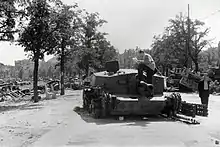43M Zrínyi
Zrínyi was a Hungarian assault gun of the World War II period. While the Turan in itself wasn't particularly successful, it did give birth a rather good self-propelled-gun, with the Zrinyi II.
| Zrínyi | |
|---|---|
.jpg.webp) Zrínyi in Kubinka Tank Museum | |
| Type | Assault gun |
| Place of origin | Kingdom of Hungary |
| Service history | |
| Used by | |
| Wars | World War II |
| Production history | |
| Manufacturer | Manfred Weiss |
| Produced | 1943–1944 |
| No. built | 1 44M Zrínyi (prototype), 66-72 43M Zrínyi |
| Variants | 43M Zrínyi 44M Zrínyi |
| Specifications (Zrínyi II) | |
| Mass | 21.6 t |
| Length | 5.68 m (18 ft 8 in) |
| Width | 2.99 m (9 ft 10 in) |
| Height | 2.33 m (7 ft 8 in) |
| Crew | 4 |
| Armour | 13–75 mm (0.51–2.95 in) |
Main armament | 105 mm MÁVAG 40/43M L20.5 howitzer with 42 rounds |
| Engine | Manfred Weiss V8 cylinder 260 hp |
Operational range | 220 km (140 mi) (road) |
| Maximum speed | 43 km/h (27 mph) (road) |
The Zriniy's development process started in 1942; after witnessing the success of the StuG III F armed with longer 75mm anti-tank guns on the Eastern Front, Hungary attempted to negotiate with Germany to try and acquire some, but, as always, could receive only a fraction of what they needed, and started to design a similar vehicle of their own.
Design and history
Following the success of assault guns on the Eastern Front, the Hungarians developed their own model, based on the chassis of the 40M Turán I tank. There were two designs, the 44M Zrínyi I, incorporated a long 43M 75 mm gun, but it did not pass the prototype stage. The 40/43M Zrínyi II was armed with a short barrel (20.5 calibers) 105 mm MÁVAG 40/43M howitzer.
The Zrínyi II design was a traditional infantry support vehicle. The Zrínyi I was hoped to fulfill an anti-tank role.

Between 40 and 66 Zrínyi II units were produced between August 1943 and July 1944 and a single Zrínyi I prototype. There is only one surviving Zrínyi II in the Kubinka tank museum near Moscow.

A serviceable Zrínyi II was captured by the Romanian troops fighting to retake Transylvania during September–October 1944, being pressed into service for a limited period.[1] The assault gun was later donated to the Red Army.
References
- Axworthy, page 221
Sources
- Bíró Ádám: A 40/43. M Zrínyi–II rohamtarack fejlesztése és alkalmazása. Haditechnika, I. rész: 1996/1, 66–71., II. rész: 1996/2, 43–45.; III. rész: 1996/4, 66–69. (In Hungarian)
- Mark Axworthy, Cornel Scafeș, Cristian Crãciunoiu, Third Axis. Fourth Ally. Romanian Armed Forces in the European War, 1941-1945, Arms and Armour, London, 1995. ISBN 1-85409-267-7
External links
 Media related to Zrinyi (self-propelled gun) at Wikimedia Commons
Media related to Zrinyi (self-propelled gun) at Wikimedia Commons- https://web.archive.org/web/20080310083509/http://www.freedom.hu/IIvh/Fegyverek/Magyar/zrinyi.htm (in Hungarian)
- http://www.haborumuveszete.hu/rovatok/fegyverek/pancelosok/zrinyik/ (in Hungarian)